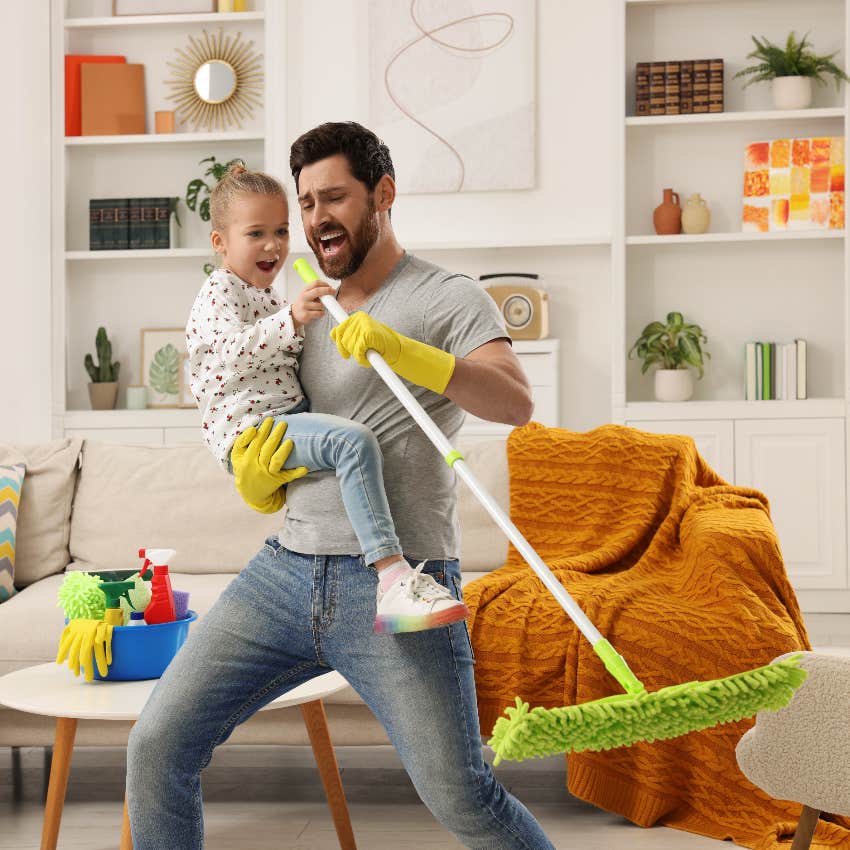My Male Clients Do Much More Housework & Childcare Than A Decade Ago And Their Wives Are Not Happier
Is housework really the main issue of marital discontent?
 Getty Images | Unsplash
Getty Images | Unsplash I began working in private practice with adults and couples in 2009. Over the decade-plus that I’ve been in practice, there have been many cultural shifts. One major change that I’ve observed is that Millennial men do far, far more housework and childcare than men in prior years. Still, their wives are equally as unhappy with them, if not more so. What can be learned from this natural experiment?
Currently, I have very few male clients under about age of 40 who don’t do half the childcare and housework on weekends. During weekdays, their share is moderated only by how many hours they are in the house, and if they work longer hours than their wives, they often also get up earlier with kids to compensate. Unlike when I started in practice or even five to seven years ago, I rarely speak to a man who considers childcare to be watching the kids “for his wife.”
Also, the COVID pandemic and skyrocketing telecommuting rates have allowed me to gain insight into how couples function when both partners work from home. Men, especially under-40s, are interrupted during telehealth sessions by their kids as often as women are. I see and hear about men doing lots of chores during their work-from-home time now. This is in contrast to prior years, when wives would complain that, on the days their husbands did work from home, they didn’t throw in a load of laundry or anything else to help out.
 Photo: New Africa / Shutterstock
Photo: New Africa / Shutterstock
Yet, women in my virtual office, both when they are speaking to me alone and with their husbands present, seem no happier now than a decade ago. Their complaints have shifted from unfair distribution of housework and childcare responsibilities to unfair distribution of emotional labor, or some other arbiter of perceived inequity. To me, this indicates that wives’ issues with their husbands can rarely be fixed by them doing more housework, and certainly that just doing more with the home and kids does not inoculate a marriage against distress. Many men have figured this out already.
Certainly, when women feel overwhelmed and stressed, it is helpful for their husbands to help out and/or hire someone to help them. However, the natural experiment of men doing a lot more housework over the past few years shows that it is (sometimes) necessary but never sufficient for men to split housework if their goal is a happy marriage. And even when men take over more than half the housework, as I see in increasingly more couples, their wives will remain unhappy if their emotional needs are not being met.
It is an interesting thought experiment to think about what might happen if a man did zero housework (let’s take an example where he has a health issue) but met all of his wife’s emotional needs. Would this wife be happier than a woman whose husband did most of the housework and few of her emotional needs? I believe so. I also think that the former example happened in many happy marriages of a generation or two ago. Most women took for granted that they would do most of the housework, and they did not interpret a husband doing less than half of the housework or childcare to mean anything negative about him or his commitment to her. But women still were lonely and sad if they felt unloved or not prioritized (despite this prioritization having nothing to do with him not doing as much or any housework).
An equivalent thought experiment would be: what if a woman did nothing around the house but met all of her husband’s sexual needs? I believe most men would hire a housekeeper and live their best life. (Remember, for many men, emotional needs are fulfilled by sex as their love language is physical touch.)
If you think that your major issue is your husband not doing enough around the house, I would wager that this is not the primary issue. The deeper issue may be that you feel unloved or insecure in other domains.
 Photo: PeopleImages.com - Yuri A / Shutterstock
Photo: PeopleImages.com - Yuri A / Shutterstock
Here’s a thought experiment: Let’s say an otherwise responsive and attentive husband was offered a massive promotion, doubling his salary and his time away from home. After discussion, you two both agreed to do it for a few years to save up money to then start your own business together. He worries about how much of the housework/childcare burden will fall on you, but you both recognize that the money will set you up well for the long term.
In this scenario, would you resent the fact that you were now going to shoulder more of the housework because he literally would not be at home to do it? Probably not, because in this example you both agreed on this together and would be working as a team toward a goal. He was concerned with the housework burden and validated it and then you both agreed it was worth it. But if during these two years, he stopped telling you he loved you and missed you and told you to stop complaining about the housework, this would be an entirely different situation and one in which you probably would not feel happily married.
Let’s take a non-hypothetical example: Military wives whose husbands are deployed have nobody to help with the housework or childcare at all, some of these women are happily married and some are not. From my work at the VA as well as working with other ex-military clients, I can tell you that the happiness of these marriages is predicated not at all by the division of housework and childcare but is related to how committed the man is to making his wife happy when he is physically present, as well as whether she feels he is in as close contact as possible when he is away.
Think deeply about whether housework is the main issue the way you think it is. The reality is this: if to you, housework is a big, overwhelming, stressful deal, and your husband minimizes and dismisses this when he is physically present and able to help, this is not a housework problem. This is a closeness and empathy problem, and it goes far beyond housework into every other aspect of your lives together.
It is just like a man saying his issue is not having enough sex. His issue is usually that his wife condescends to his need for sex. He becomes aware of this when I ask, “What if your wife had a medical issue where she couldn’t have sex at all but was sad about how that impacted you?” All of these “sex-obsessed” men say, “If she understood how it impacted me and cared about that, I would be fine.” There is no way to fully love your partner if you deny their need for sex or their need to be helped with housework or anything else because love can’t flourish in an environment of dismissal and condescension.
Discuss with your partner! Anything that sparks a discussion where you both look at an old issue in a new way can promote growth and mutual understanding.
Dr. Samantha Rodman Whiten, aka Dr. Psych Mom, is a clinical psychologist in private practice and the founder of DrPsychMom. She works with adults and couples in her group practice Best Life Behavioral Health.

